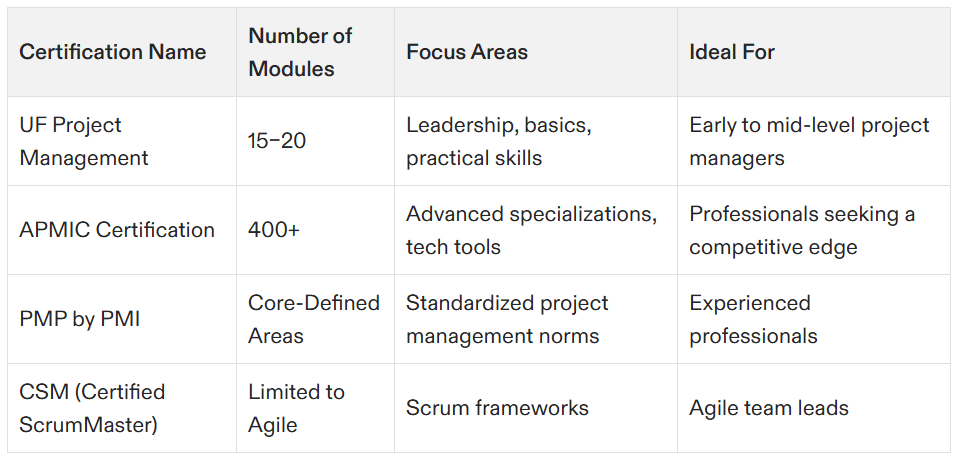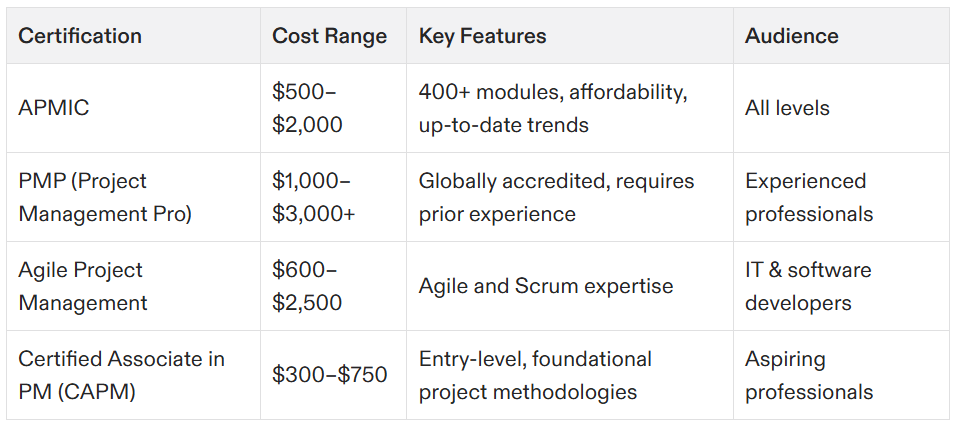Table of Contents
- What is a Military Project Management Certification?
- Helpful Tips About Military Project Management Certification
- Why Choose Military Project Management Certification?
- Key Components of the Certification Program
- Who Should Pursue Military Project Management Certification?
- Steps to Achieving Your Certification
- FAQs About Military Project Management Certification
- Informative Table on APMIC Certification
Military leadership demands precision, discipline, and the ability to execute complex missions under high stakes. For veterans and active-duty personnel transitioning into civilian or government project management roles, one credential stands out for its unique alignment with military values and operations – the military project management certification.
This certification is your ticket to bridging the gap between military experience and professional project management. Whether you're gearing up for private sector roles, federal projects, or military-specific initiatives, this program equips you with the expertise to handle projects with military-grade precision while meeting industry standards.
This article dives deep into the what, why, and how of military project management certification, ensuring you leave here with all the tools to make an informed decision.
What is a Military Project Management Certification?
A military project management certification is a specialized credential designed to train individuals in managing projects with military applications and beyond. This certification not only sharpens traditional project management skills but adapts them to the unique challenges and structures of military operations.
The training is tailored for active-duty service members, veterans, and defense contractors, offering frameworks that resonate with mission-critical operations, logistical precision, and organizational discipline—skills honed in military service.
Hyper-focused on making the transition from command to corporate seamless, the coursework includes in-depth lessons in team leadership, budgeting, risk analysis, scheduling, and operational planning.
Helpful Tips About Military Project Management Certification
- Research accredited programs, like APMIC, that align with your career goals and offer military-specific project management training.
- Utilize your military experience in leadership, risk management, and logistics as a foundation for understanding project frameworks like Agile or Scrum.
- Dedicate regular time to studying, especially for modules covering risk and operational planning.
- Explore GI Bill funding or military education benefits to reduce costs.
- Actively network with defense contractors and federal agencies seeking certified project managers.
- Post-certification, tailor your resume to highlight transferable military skills enhanced by your certification to stand out in civilian job markets.
Why Choose Military Project Management Certification?
The importance of military project management certification lies in three key areas:
1. Utilizing Your Military Skills in the Civilian Job Market
Project management certifications like APMIC leverage skills already instilled in you through military training—discipline, leadership, strategy, and execution—and apply them to widely recognized project management frameworks like Agile, Scrum, and PMI’s PMBOK Guide.
2. Boosting Career Opportunities
This certification significantly broadens your job prospects, allowing you to pursue positions in industries like defense contracting, construction, logistics, tech, and even event planning. Employers value candidates who can implement strategies with the organizational rigor synonymous with military operations.
For example, defense contracting giant BAE Systems routinely hires project managers with military backgrounds due to their ability to thrive under challenging conditions.
3. Certifying Your Skills for Federal and Private-Sector Projects
Many federal agencies and private organizations specifically seek professionals certified in military and defense-centric project management. Whether you're managing tactical weapons system deployment or handling supply chain logistics across continents, your certification signals your ability to take charge.
Key Components of the Certification Program
A comprehensive military project management certification program offers a robust curriculum tailored to the demands of both military and civilian projects. Below are essential components you can anticipate learning:
1. Operational Planning and Execution
Master strategies to organize, delegate, and execute mid-to-long-term missions or projects.
2. Logistics and Supply Chain Management
Deepen your understanding of managing critical supplies, inventory, and global distribution—aptitudes valued equally in military operations and large-scale business models.
3. Risk Management
Learn how to identify, assess, and mitigate risks with real-time contingencies while maintaining a project’s timeline and budget.
4. Team Leadership and Communication
Hone your ability to motivate and inspire cross-functional teams—just as you did during deployments. It reinforces principles of accountability, empathy, and directive clarity.
5. Adaptation of Agile and Scrum Frameworks
Learn project management methodologies that dominate today’s business ecosystem without undermining disciplined operational benchmarks common to military execution.
Want to explore detailed program offerings and learn how to get started? Visit the military project management certification program website now and kickstart your career today!
Who Should Pursue Military Project Management Certification?
This program is designed for several key groups who can benefit from its specialized framework:
- Active-Duty Military Members working in logistics, operations, or command positions.
- Veterans entering the private sector with skills transferable to project management.
- Federal Employees managing defense or government contracts.
- Defense Contractors seeking advancement in their current roles.
- Civilians managing military-style or defense-focused projects in multinational corporations.
Steps to Achieving Your Certification
If you're ready to take the next leap, here's a step-by-step guide to obtaining your military project management certification:
Research Accredited Programs
Ensure the program you choose is accredited, such as the one offered by APMIC.Complete Prerequisites
Some programs recommend or require prior project management knowledge or leadership experience. However, military training often fulfills these prerequisites.Enroll in the APMIC Certification Program
Programs like APMIC offer over 400 modules designed to cover everything—providing the breadth and depth necessary to thrive in a competitive landscape.Study and Earn Your Credential
Commit to the coursework, exams, and any required capstone projects or hands-on applications.Apply for Suitable Roles
With certification in hand, search for roles on platforms like LinkedIn, Indeed, or defense contractor job boards.
Not sure where to begin? Start by exploring the APMIC program for military project management certification.
FAQs About Military Project Management Certification
Q1. What is the cost of military project management certification?
The cost varies by program. However, many service members might qualify for discounts or funding through programs like the GI Bill. Accredited providers like APMIC often provide payment plans to support affordability.
Q2. How long does it take to complete the certification?
Completion times can range from six months to a year, depending on whether you study full-time or part-time.
Q3. Can active-duty military members enroll?
Yes, active-duty members can enroll. The program accommodates flexible study schedules tailored to demanding military lifestyles.
Q4. Is APMIC certification aligned with private-sector job requirements?
Absolutely. APMIC bridges military experience with corporate frameworks like Agile and Scrum, ensuring you can apply your knowledge to any context.
Q5. Are there job placement services after the program?
Some programs, including APMIC, provide job placement assistance or networking opportunities with employers specializing in military-friendly roles.
Informative Table on APMIC Certification
A career in military project management starts with the right certification. Whether you're transitioning into the civilian workforce or advancing within defense contracting, the military project management certification delivers the expertise and recognition needed to lead projects confidently. The road ahead is straightforward, and opportunities await—are you ready to march forward?



